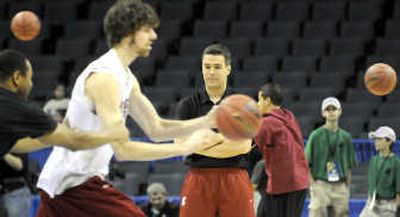Heroes or Heels?

CHARLOTTE, N.C. – At times, the contrast is so obvious that to mention it almost seems redundant.
Tonight, in the first game of the NCAA East Regional at the Bobcats Arena here, it’s not so much a contrast as a chasm.
On one side is the tournament’s top seed and seemingly everyone in the Arena’s favorite, North Carolina. On the other is Washington State, a No. 4 seed that surprised most of the national media by getting to the Sweet 16.
On one side is one of America’s most storied men’s basketball programs, a four-time national and 20-time Atlantic Coast Conference champion. On the other, well, there’s a bunch of stories but no Pac-10 titles, let alone national ones.
On one side is a handful of McDonald’s All-Americans. On the other side is a bunch of guys who eat at McDonald’s.
But those differences aren’t as wide as what will be displayed on the court. North Carolina will pit its up-and-down, run-at-every-opportunity approach against WSU’s patient attack and transition defense.
“There are different ways to play the game,” said WSU coach Tony Bennett at Wednesday’s news conference. “The system we run, everybody has this perception, I’m used to it, (that) it’s boring, it’s slow, it’s not fun.
“I think we play good basketball.”
Not everyone in the Tar Heel state agrees.
“Call it what you want,” Bennett answered when asked if describing WSU’s style of play as boring bothered him. “We just have to find a way to be successful. We’ve turned it around the last couple of years and we don’t fly up and down.”
To be successful tonight, the 21st-ranked Cougars (26-8) know they’ll have to keep the Heels from flying up and down, or they’ll get run over by them.
The Cougs held their first two NCAA foes to 40 and 41 points, respectively, and someone asked Kyle Weaver what would be a good number tonight.
“Thirty-nine,” Weaver said, drawing a laugh. “Keep it low. That would be nice.”
Nice for him, but probably not likely.
The Tar Heels are the nation’s No. 2 scoring team at 89.9 points a game. They outrebound their opponents by, on average, a Division I-best 11.6 a contest, of which half the edge comes on the offensive glass.
In way of contrast, the Cougars score just 67 points and outrebound opponents by a paltry half-a-rebound per game.
Of course, WSU has strengths. The Cougars defense, which seems to be peaking in the postseason, yields 56.1 points a game, making them No. 2 nationally in that category. The Tar Heels go the other way, giving up 72.9 points each contest, in the bottom third of Division I schools.
So, obviously, tonight’s game will be a battle of wills – and tempo. The faster the game becomes, the more the 34-2 Tar Heels prosper.
But how can the Cougars stop the irresistible Carolina break?
“I’m going to get back,” Taylor Rochestie said, stating the obvious way to defend point guard Ty Lawson and North Carolina’s blue wave. “As soon as a shot goes up, it’s going to be like the start of a race when you hear the gun.”
“Just get back in transition,” Weaver added. “If you make them play half-court offense over our defense, if we get set every time down and make them shoot tough shots, I think we have a chance.”
However, the Tar Heels don’t believe anyone can stop their running game completely.
“I think as long as we do what we’re supposed to do, and play North Carolina basketball, we’ll be just fine,” sophomore Wayne Ellington said. “We’ve played against a lot of half-court teams and I think we’re used to having teams slow us down and turn it into a half-court game.
“(If) we do our job on defense, attack the backboards and get the ball out quick, we’ll be able to play our style of game all game long.”
Weaver sees Ellington’s point, agrees with part of it, but is willing to draw a distinction.
“A team like that, once they get rhythm, it’s hard to slow them down,” he said. “So it’ll be important for us to get out early and try to slow them down.”
“That’s the great challenge,” Bennett said. “You’re going to have to get back if you are going to have a chance.”